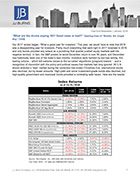As you may have heard, the Federal Reserve recently cut its benchmark lending rate, and many are wondering how this affects their financial situation.
Below are answers to some common questions we’ve been getting. We hope you find this information helpful.
What Happened?
The Federal Reserve made a significant move by cutting its benchmark interest rate by 0.50%, lowering it to a target range of 4.75%-5.00%. This is the first rate cut since 2020, following a period between March 2022 and July 2023 of rapid rate increases designed to combat inflation.
The rate reduction is expected to relieve some of the financial pressure that consumers have experienced in recent years. After some initial wobbliness, markets digested the cut positively, with the Dow and S&P 500 hitting record highs the day after the large rate cut.
Federal Reserve Chair Jerome Powell’s “recalibration” commentary after Wednesday’s rate cut announcement was deemed as the reason for soaring asset prices on Thursday.
Why Is It Significant?
After the Federal Reserve increases rates to combat inflation, the next key step is to reduce those rates to avoid an economic slowdown. Lower rates too soon, and inflation could come back. Lower rates too late, and a recession could occur.
There is some concern that the Federal Reserve has waited too long, given recent lackluster jobs data. However, the consensus the day after the Fed rate decision was that the Fed didn’t cut rates by 50 basis points due to a substantially weakening economy, but rather to shore up the labor market.
Additionally, the Fed’s forecast for the rest of the year includes a total of only a 50-basis-point decrease ahead, suggesting Fed officials are confident the job market is not tanking.
From a consumer’s perspective, rate cuts like this tend to lower borrowing costs for products like mortgages, auto loans, and credit cards.
How Will It Affect Credit Card Interest Rates?
Credit card interest rates, which are often tied to the prime rate, are expected to decrease slightly. However, the drop in rates may not be immediate or large. Credit card issuers typically take time to adjust rates, and the decrease will likely be modest.
Will My Existing Credit Card Rates Go Down?
If your credit card has a variable APR, you may see a slight decrease in your rate as the prime rate falls. However, it’s important to remember that this isn’t guaranteed, and the reduction may take some time to show on your statements. Keep an eye on your monthly statements to track any changes.
How Will It Impact Mortgage Rates?
Mortgage rates have already started to decline in anticipation of the rate cut, and they could continue to drop. If you’re considering buying a home or refinancing your mortgage, now might be a good time to act, as rates are expected to remain lower in the near future.
Are More Rate Cuts Coming?
The Fed has indicated that more rate cuts could be on the horizon. Some analysts predict rates could drop to 4.00%-4.25% by the end of the year, though the Fed is currently signaling the benchmark rate will end the year at 4.25%-4.50%.
We hope these answers provide clarity. If you have any questions or would like to discuss how this rate cut might impact your personal financial situation, please don’t hesitate to contact us anytime.
– Your Wealth Management Team at JJ Burns & Company
Disclosure: J.J. Burns & Company, LLC is a registered investment adviser with the U.S. Securities & Exchange Commission and maintains notice filings with the States of New York, Florida Pennsylvania, New Jersey, Connecticut, Georgia, Illinois, North Carolina, and California. J.J. Burns & Company, LLC only transacts business in states where it is properly registered, or excluded or exempted from registration. Follow-up and individualized responses to persons that involves either the effecting or attempting to effect transactions in securities, or the rendering of personalized investment advice for compensation, as the case may be, will not be made absent compliance with state investment adviser and investment adviser representative registration requirements, or an applicable exemption or exclusion.
All investing involves risk, including the potential for loss of principal. There is no guarantee that any investment plan or strategy will be successful.
The foregoing content reflects the opinions of J.J. Burns & Company, LLC and is subject to change at any time without notice. Content provided herein is for informational purposes only and should not be used or construed as investment advice or a recommendation regarding the purchase or sale of any security. There is no guarantee that the statements, opinions or forecasts provided herein will prove to be correct.
Past performance may not be indicative of future results. Indices are not available for direct investment. Any investor who attempts to mimic the performance of an index would incur fees and expenses which would reduce returns.
Securities investing involves risk, including the potential for loss of principal. There is no assurance that any investment plan or strategy will be successful.


